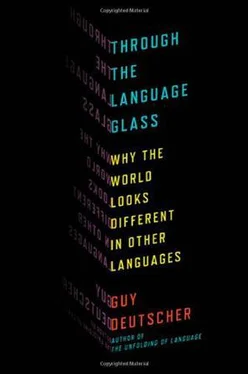More generally, the explanation for cognitive differences between ethnic groups has shifted over the last two centuries, from anatomy to culture. In the nineteenth century, it was generally assumed that there were significant inequalities between the hereditary mental faculties of different races, and that these biological inequalities were the main reason for their varying accomplishments. One of the jewels in the crown of the twentieth century was the recognition of the fundamental unity of mankind in all that concerns its cognitive endowment. So nowadays we no longer look primarily to the genes to explain variations in mental characteristics among ethnic groups. But in the twenty-first century, we are beginning to appreciate the differences in thinking that are imprinted by cultural conventions and, in particular, by speaking in different tongues.
Epilogue: Forgive Us Our Ignorances
Language has two lives. In its public role, it is a system of conventions agreed upon by a speech community for the purpose of effective communication. But language also has another, private existence, as a system of knowledge that each speaker has internalized in his or her own mind. If language is to serve as an effective means of communication, then the private systems of knowledge in speakers’ minds must closely correspond with the public system of linguistic conventions. And it is because of this correspondence that the public conventions of language can mirror what goes on in the most fascinating and most elusive object in the entire universe, our mind.
This book set out to show, through the evidence supplied by language, that fundamental aspects of our thought are influenced by the cultural conventions of our society, to a much greater extent than is fashionable to admit today. In the first part, it became clear that the way our language carves up the world into concepts has not just been determined for us by nature, and that what we find “natural” depends largely on the conventions we have been brought up on. That is not to say, of course, that each language can partition the world arbitrarily according to its whim. But within the constraints of what is learnable and sensible for communication, the ways in which even the simplest concepts are delineated can vary to a far greater degree than what plain common sense would ever expect. For, ultimately, what common sense finds natural is what it is familiar with.
In the second part, we saw that the linguistic conventions of our society can affect aspects of our thought that go beyond language. The demonstrable impact of language on thinking is very different from what was touted in the past. In particular, no evidence has come to light that our mother tongue imposes limits on our intellectual horizons and constrains our ability to understand concepts or distinctions used in other languages. The real effects of the mother tongue are rather the habits that develop through the frequent use of certain ways of expression. The concepts we are trained to treat as distinct, the information our mother tongue continuously forces us to specify, the details it requires us to be attentive to, and the repeated associations it imposes on us-all these habits of speech can create habits of mind that affect more than merely the knowledge of language itself. We saw examples from three areas of language: spatial coordinates and their consequences for memory patterns and orientation, grammatical gender and its impact on associations, and the concepts of color, which can increase our sensitivity to certain color distinctions.
According to the dominant view among linguists and cognitive scientists today, the influence of language on thought can be considered significant only if it bears on genuine reasoning-if, for instance, one language can be shown to prevent its speakers from solving a logical problem that is easily solved by speakers of another language. Since no evidence for such constraining influence on logical reasoning has ever been presented, this necessarily means-or so the argument goes-that any remaining effects of language are insignificant and that fundamentally we all think in the same way.
But it is all too easy to exaggerate the importance of logical reasoning in our lives. Such an overestimation may be natural enough for those reared on a diet of analytic philosophy, where thought is practically equated with logic and any other mental processes are considered beneath notice. But this view does not correspond with the rather modest role of logical thinking in our actual experience of life. After all, how many daily decisions do we make on the basis of abstract deductive reasoning, compared with those guided by gut feeling, intuition, emotions, impulse, or practical skills? How often have you spent your day solving logical conundrums, compared with wondering where you left your socks? Or trying to remember where your car is in a multilevel parking lot? How many commercials try to appeal to us through logical syllogisms, compared with those that play on colors, associations, allusions? And finally, how many wars have been fought over disagreements in set theory?
The influence of the mother tongue that has been demonstrated empirically is felt in areas of thought such as memory, perception, and associations or in practical skills such as orientation. And in our actual experience of life, such areas are no less important than the capacity for abstract reasoning, probably far more so.

The questions explored in this book are ages old, but the serious research on the subject is only in its infancy. Only in recent years, for example, have we understood the dire urgency to record and analyze the thousands of exotic tongues that are still spoken in remote corners of the globe, before they are all forsaken in favor of English, Spanish, and a handful of other dominant languages. Even in the recent past, it was still common for linguists to claim to have found a “universal of human language” after examining a certain phenomenon in a sample that consisted of English, Italian, and Hungarian, say, and finding that all of these three languages agreed. Today, it is clearer to most linguists that the only languages that can truly reveal what is natural and universal are the hosts of small tribal tongues that do things very differently from what we are used to. So a race against time is now under way to record as many of these languages as possible before all knowledge of them is lost forever.
The investigations into the possible links between the structure of society and the structure of the grammatical system are in a much more embryonic stage. Having languished under the taboo of “equal complexity” for decades, the attempts to determine to what extent the complexity of various areas in grammar depends on the complexity of society are still mostly on the level of discovering the “how” and have barely began to address the “why.”
But above all, it is the investigation of the influence of language on thought that is only just beginning as a serious scientific enterprise. (Its history as a haven for fantasists is of much longer standing, of course.) The three examples I presented-space, gender, and color-seem to me the areas where the impact of language has been demonstrated most convincingly so far. Other areas have also been studied in recent years, but not enough reliable evidence has yet been presented to support them. One example is the marking of plurality. While English requires its speakers to mark the difference between singular and plural whenever a noun is mentioned, there are languages that do not routinely force such a distinction. It has been suggested that the necessity (or otherwise) to mark plurality affects the attention and memory patterns of speakers, but while this suggestion does not seem implausible in theory, conclusive evidence is still lacking.
Читать дальше












